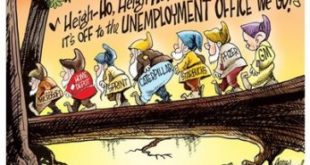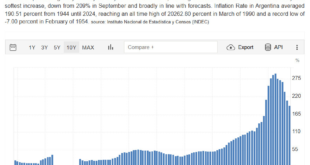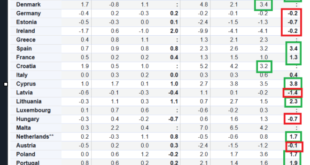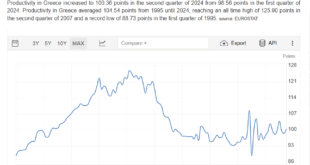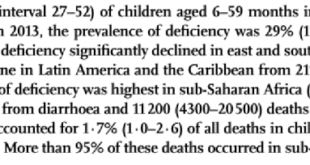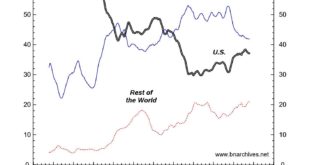from Lars Syll The NAIRU story has always had a very clear policy implication — attempts to promote full employment are doomed to fail since governments and central banks can’t push unemployment below the critical NAIRU threshold without causing harmful runaway inflation. Although a lot of mainstream economists and politicians have a touching faith in the NAIRU fairy tale, it doesn’t hold water when scrutinized. One of the main problems with NAIRU is that it is essentially a timeless...
Read More »Monetary developments in the Euro Area, september 2024. Quiet.
Like John Stuart Mill, I´m more interested in credit than in money. Developments in the amount of credit provided are much more instructive to the economist than data on money. Look at the graph below (no. 2 in the ECB press release) , a highly Post-Keynesian graph that originated from the pre-Euro Bundesbank and is now published by the European Central Bank. It shows that money growth in the EU is relatively moderate and, more interesting, caused by a combination of 1) lather large...
Read More »Superinflation in Milei´s Argentina
Hyperinflation is defined as over 50% inflation per month. Let´s define ´normal´ inflation as anything between 0 and 1% per month and anything between 1 and 50% per month as superinflation (1% a month is still a lot, yearly!). Before President Milei, Argentina already knew superinflation. After Milei, inflation accelerated, and the country almost entered a period of hyperinflation. It´s still nearly 200% a year. The maximum monthly increase of the consumer price index was over 24%. These...
Read More »Election: Take Four
from Peter Radford Take four. I continue to listen in on the conversation. The election reverberates loudly around leftish circles. Recriminations mount. Criticisms fly. Finger pointing and over-analysis have become all too common. And this is after just a week. Imagine what a month can produce. So far the central narrative seems to be that the Democrats have become isolated from the most consequential issues that regular folk feel are important. The explanation being that the party is...
Read More »Employment growth in Europe. Stark differences.
Eurostat published new data on employment in Europe. Average employment growth is +0,9%. The average hides stark differences. A Germany-centered core consisting of Germany, Austria, Sweden, Estonia, Finland, and Hungary shows declines. Surprisingly, it excludes Denmark, Belgium and the Netherlands. The South does better. Countries like Portugal, France, Greece, and, especially, Spain post above-average increases. But unemployment in these countries is still high (over 5%), even when EU...
Read More »In Greece, gross fixed investment still is at a pre-industrial level.
Executive summary: if investments are needed, do not reform. Invest. Investments are the reform. Angus Maddison (historical patterns of growth) and Jan Kregel (leading post-Keynesian economist) were the intellectually dominant forces during my economics study in Groningen around 1982. Let´s apply their frameworks to Greece. Growth, as we measure it, has many sources: increasing the productivity of existing activities (the mechanization of the potato harvest), shifting labour from...
Read More »Argentina bucks the trend. Vitamin A deficiencies are increasing
Because of libertarian policies of the Milei government in Argentina, poverty and food deficiencies are increasing. People are getting less healthy and, hence, less able to care for themselves and their loved ones. One problem we thought we got rid of but resurfaces in Argentina: vitamin A deficiencies. Children are getting sick and starting to go blind. Vitamin A helps your body protect itself against many diseases. Thanks to concerted action and diffusion of knowledge and action,...
Read More »Making America Great Again, 2024
from Shimshon Bichler & Jonathan Nitzan In 2019, we published a RWER paper assessing Trump’s promise to ‘Make America Great Again’. https://bnarchives.net/id/eprint/630/ Here are updates of two key charts from this paper. The first figure depicts the relative global decline of U.S. corporations. It shows that U.S. firms currently accounts for ~1/3rd of global corporate profit, down from 2/3rds half a century ago. The second figure shows the growing dependence of U.S. firms on foreign...
Read More »Völkermord in Gaza. Two million deaths are in the cards.
The new UN report on deaths in Gaza makes for Grim Reading. According to the admirable work of UN data sleuths, details close to 10.000 of the official 40.000+ deaths have been added. These are only the direct victims; indirect victims (starvation, stress, sickness) are omitted. One of the findings is that, unlike during earlier periods of war in Gaza, killing is indiscriminate. Many of the victims were women and children (graphs). The youngest victim was one day old, and the oldest was...
Read More »Weekend read – Logic and truth in economics
from Lars Syll To be ‘analytical’ and ‘logical’ is something most people find recommendable. These words have a positive connotation. Scientists think more deeply than most other people because they use ‘logical’ and ‘analytical’ methods. In dictionaries, logic is often defined as “reasoning conducted or assessed according to strict principles of validity” and ‘analysis’ as having to do with “breaking something down.” But that’s not the whole picture. As used in science, analysis usually...
Read More » Real-World Economics Review
Real-World Economics Review

